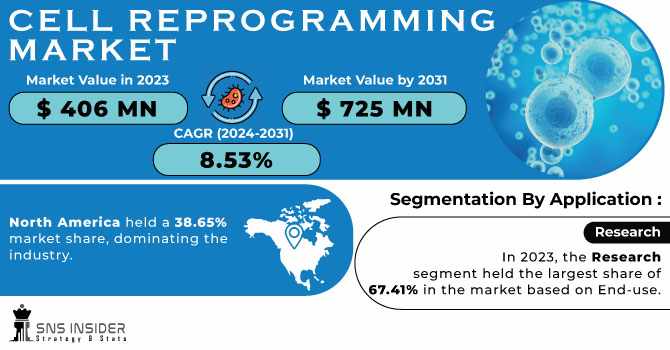
The Cell Reprogramming Market size was valued at USD 398.52 million in 2023 and is expected to reach USD 689.17 million by 2031, growing at a CAGR of 7.0% over the forecast period 2024–2031. This upward trajectory is driven by the increasing adoption of cell reprogramming technologies in regenerative medicine, stem cell therapy, and personalized drug development.
Market Overview
Cell reprogramming involves the transformation of somatic cells into a pluripotent state, enabling them to differentiate into various cell types. This technique has unlocked new possibilities in disease modeling, tissue engineering, and therapeutic innovation. As healthcare systems globally shift toward precision medicine, cell reprogramming is becoming a cornerstone in developing patient-specific treatments with reduced side effects and improved efficacy.
Advancements in gene editing tools, such as CRISPR/Cas9, and the rising prevalence of chronic and degenerative diseases have significantly boosted the demand for reprogrammed cells in both research and clinical settings. The market is also benefitting from growing investments by biotechnology companies and increased academic interest in stem cell research.
Get Free Sample Report @ https://www.snsinsider.com/sample-request/4186
Regional Analysis
North America dominates the market due to its robust biotechnology infrastructure, high R&D funding, and strong presence of leading research institutions.
Europe is witnessing steady growth, driven by supportive government initiatives and increasing stem cell research activities.
Asia-Pacific is emerging as a key region, propelled by expanding healthcare facilities, increased research collaborations, and rising awareness about advanced therapies.
Latin America and Middle East & Africa are gradually entering the space, supported by growing healthcare investments and training programs for regenerative medicine.
Market Segmentation
By Type:
Somatic Cell Reprogramming
Induced Pluripotent Stem Cell (iPSC) Reprogramming
Direct Lineage Reprogramming
By Application:
Drug Discovery and Development
Regenerative Medicine
Cell Therapy
Disease Modeling
Others
By End User:
Academic and Research Institutes
Biopharmaceutical Companies
Clinical Laboratories
Hospitals
Others
Key Players
A few prominent entities functioning on a global scale comprise the following: Osiris Therapeutics Inc., Cynata, Astellas Pharma Inc., Sanofi, FUJIFILM Holdings Corporation, EVOTEC, Japan Tissue Engineering Co., Ltd., Mesoblast, Advanced Cell Technology Inc., Human Longevity Inc., Celgene Corporation, and other players.
Key Highlights
Rising demand for personalized and regenerative therapies is a major growth catalyst.
Technological advancements in reprogramming methods improving cell efficiency and safety.
Integration of AI and automation enhancing cell reprogramming workflows.
Increasing partnerships between academia and biotech companies.
Expanding use of reprogrammed cells in neurodegenerative and cardiovascular diseases.
Future Outlook
The future of the cell reprogramming market is highly promising, with expanding applications across a wide range of therapeutic and research domains. As the understanding of cellular biology deepens, the use of reprogrammed cells in creating patient-specific models and regenerative therapies will become mainstream. Furthermore, continued innovation in delivery systems and safety mechanisms will improve the translational success of cell-based therapies. The convergence of reprogramming with artificial intelligence and automation will further optimize the discovery pipeline, reduce costs, and accelerate commercialization.
Conclusion
The cell reprogramming market is undergoing rapid evolution, fueled by scientific breakthroughs and growing clinical demand. With increasing investment, supportive regulatory frameworks, and expanding applications in precision medicine, this market is expected to play a transformative role in the future of healthcare and biomedical innovation.
Contact Us:
Jagney Dave - Vice President of Client Engagement
Phone: +1-315 636 4242 (US) | +44- 20 3290 5010 (UK)
Other Related Reports:




















Write a comment ...